
Timeline: Rustavi 2 TV Row
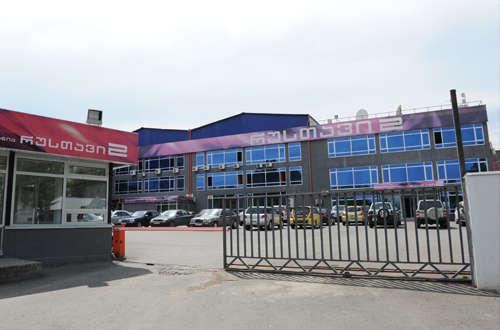
Headquarters of Tbilisi-based Rustavi 2 TV. File hoto: Eana Korbezashvili/Civil.ge
Ownership dispute over Georgia’s leading private television channel, Rustavi 2, dates from 2004, when series of change in broadcaster’s ownership started through controversial deals, which have repercussions, including political ones, more than a decade later. The recent crisis, which has receded to some extent at least for now after reinstatement of Rustavi 2 management, stems from a lawsuit which broadcaster’s one of the former owners Kibar Khalvashi lodged with the Tbilisi City Court in early August seeking to reclaim his shares in Rustavi 2.
Below is a timeline of key developments since Khalvashi’s lawsuit was filed.
August 5, 2015
Lawyer representing Kibar Khalvashi, who owned Rustavi 2 TV in 2004-2006, announced that his client filed a lawsuit with the Tbilisi City Court seeking reclaiming shares in the broadcaster; Khalvashi claimed that he was coerced into selling his shares in Rustavi 2 TV by then leadership of the country in late 2006. Khalvashi’s lawsuit was condemned by Rustavi 2 and opposition parties, with UNM most vocal among them, as government-orchestrated attempt to take over most popular and opposition-minded television station. Government and senior figures from the GD ruling coalition have been dismissing these allegations since then and claiming that the dispute is between private entities and the authorities have nothing to do with it.
August 7, 2015
It was announced that the court ordered as an interim measure asset freeze of Rustavi 2 TV as part of Khalvashi’s lawsuit. The court injunction, ordered by Tbilisi City Court judge Tamaz Urtmelidze, involved banning Rustavi 2 TV’s current shareholders to sell shares, as well as to sell or rent out broadcast equipment, vehicles and other property owned by the Rustavi 2; executive powers of its general director Nika Gvaramia and financial director Kakha Damenia were also limited with the same court injunction.
September 30, 2015
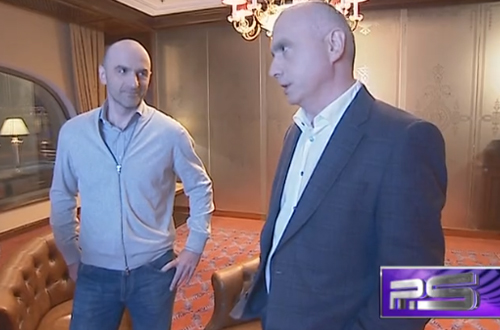
Screengrab from Rustavi 2 TV footage showing 91% shareholders of the broadcaster, brothers Levan (left) and Gia (right) Karamanishvili during their first, and so far the only, TV interview, recorded in Ukraine and aired by the Rustavi 2 in early November, 2015.
Court orders addition injunction, freezing assets of Rustavi 2 TV majority shareholder – “TV Company Georgia”.
Rustavi 2 TV majority shareholders, brothers Giorgi and Levan Karamanishvili, own 51% shares in broadcaster indirectly through their whole owned TV Company Georgia; they own additional 40% of Rustavi 2 directly. Brothers Karamanishvili, who are little known to wider public in Georgia, are ex-president Mikheil Saakashvili’s close associates.
Asset freeze on TV Company Georgia blocked brother Karamanishvili’s intention to sell TV Company Georgia to a relative of ex-defense minister Davit Kezerashvili for USD 400,000 through which the buyer was becoming 51% shareholder of Rustavi 2; the potential deal also involved a provision in which the buyer was pledging USD 6 million investment in Rustavi 2 in several tranches before February, 2017. Chief executive of Rustavi 2 TV, Nika Gvaramia, who held senior government posts in ex-president Mikheil Saakashvili’s government, said the additional court injunction was cutting off vital investment for the broadcaster; he accused judge Tamaz Urtmelidze of being bribed by ex-PM Bidzina Ivanishvili and said: “Soil will burn under judge Urtmelidze’s feet… He will never find a safe haven in this country.”
- Rustavi 2 TV Accuses Govt of Blocking Its Funding Deal
- Media Advocacy Coalition’s Statement on Rustavi 2 TV Case
October 3, 2015
President Giorgi Margvelashvili said that “problems have been created” to the operation of Rustavi 2 TV and developments in the Georgian media triggers “serious questions.”
October 8, 2015
U.S. ambassador to Georgia, Ian Kelly, said the U.S. has expressed concerns to the Georgian government over actions that give the appearance of constricting media freedom.
October 16, 2015
Parliament voted down a draft statement tabled by the opposition UNM party, expressing “concern over government pressure” on Rustavi 2 TV.
October 19, 2015
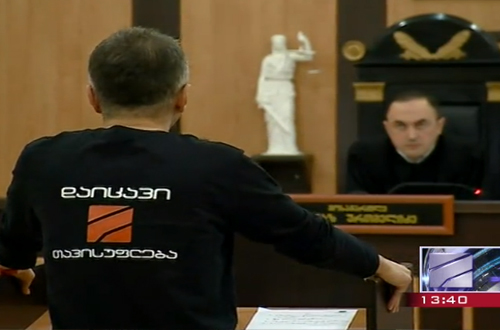
A screengrab from TV footage showing Rustavi 2 TV CEO Nika Gvaramia, wearing a t-shirt with broadcaster’s logo and inscription reading “defend freedom”, speaks to Tbilisi City Court judge Tamaz Urtmelidze during the court hearing on October 19, 2015.
Tbilisi City Court judge, Tamaz Urtmelidze, refused to recuse himself from Rustavi 2 TV ownership dispute case. Motion for recusal was filed by Rustavi 2 TV lawyers and was opposed by legal representatives of the plaintiff Kibar Khalvashi, ex-owner of the broadcaster. Respondents sought judge recusal arguing that he was biased in favor the plaintiff. The motion was based on two key arguments; Rustavi 2 lawyers claimed that the government had levers to exert influence on the judge through criminal proceedings, which were launched against Urtmelidze’s mother in connection to a domestic incident that occurred more than a year and nine months ago. Another argument, cited by the respondents, was relate to several negative comments posted by judge’s wife on her Facebook account about Rustavi 2 TV and its chief executive Nika Gvaramia.
October 21, 2015
Chief executive of Rustavi 2 TV, Nika Gvaramia, claimed that he received a threat from the government via a middleman to leak a video of his personal life and recordings of his phone conversations with Georgia’s ex-president and now governor of Odessa region in Ukraine Mikheil Saakashvili if he refuses to “step aside” from the television station. Prosecutor’s office launched investigation into the allegation.
- Rustavi 2 TV Head Accuses Govt of Blackmail
- Prosecutors Question Rustavi 2 TV Head in Blackmail Allegation Probe
October 22, 2015
President Giorgi Margvelashvili made a brief live televised statement and said the recent developments, including over Rustavi 2 TV ownership dispute and remarks by PM Irakli Garibashvili earlier on the same day, “escalated political climate and created prerequisites of civil confrontation and violation of constitutional order.” The President also called on the judge, adjudicating Rustavi 2 TV ownership dispute, not to make “hasty and rigid” decisions. His remarks were condemned by many politicians from the ruling Georgian Dream coalition as meddling in the judiciary.
October 22, 2015
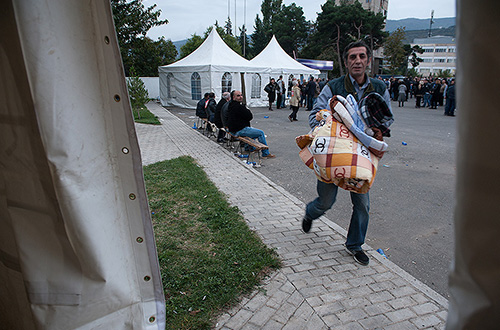
Yard of Rustavi 2 TV headquarters, October 22, 2015. Photo: Eana Korbezashvili/Civil.ge
Tents were placed in the yard of Rustavi 2 TV headquarters in Tbilisi and blankets brought as demonstrators, rallying in support of the broadcaster, were saying that they were ready to keep vigil in order to protect the broadcaster from what they were saying was government’s attempt to take over Rustavi 2. Supporters of the broadcaster were rallying regularly both outside the Rustavi 2 headquarters and Tbilisi City Court in parallel to court hearings and the broadcaster itself was regularly calling on viewers for rallying to “defend freedom of media.”
October 22, 2015
OSCE Representative on Freedom of the Media, Dunja Mijatović, expressed concerned over the ongoing ownership dispute over Rustavi 2 TV and its implications for media pluralism in Georgia.
October 22, 2015
U.S. State Department deputy spokesperson Mark Toner said at a press briefing that the U.S. is “concerned about any steps that might lead to the closure” of Rustavi 2 TV, and also added that in general the U.S. is “encouraged by Georgia’s open environment for media and civil society.”
October 24, 2015
The Georgian State Security Service said in a brief statement that it has opened investigation under article 315 of the criminal code involving “conspiracy to overthrow” the government. Investigation was launched based on unspecified “operative-investigative activities carried out by the counter-intelligence department” and information reported by a shadowy website, which claimed that ex-president Mikheil Saakashvili and his allies from the UNM opposition party were plotting an attack against Rustavi 2 TV personnel in order to then trigger mass protests against the government. One of UNM’s leaders Giga Bokeria was questioned in connection to this investigation on the same day.
October 26, 2015
The EU delegation and Tbilisi-based ambassadors from the EU-member states said in a statement that they are closely monitoring media environment in Georgia and while they refrain from commenting on the merits of ongoing court case over Rustavi 2 TV ownership dispute, they have “concerns to be addressed.”
October 27, 2015
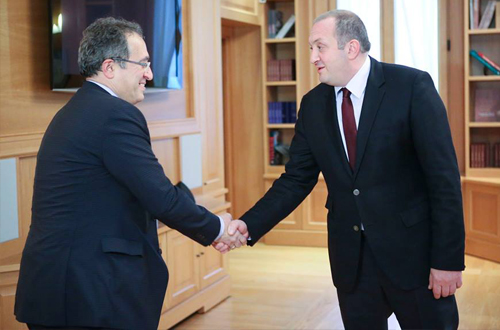
President Giorgi Margvelashvili (right) meets Kibar Khalvashi (left) at the presidential palace on October 27, 2015. Photo: president’s office
President Giorgi Margvelashvili met in the presidential palace Rustavi 2 TV ex-owner Kibar Khalvashi. Prior to that the President held series of meetings and consultations with representatives from the civil society groups, media organizations, foreign diplomats and political parties, as well as parliament speaker Davit Usupashvili.
October 28, 2015
Court hearing into Khalvashi’s lawsuit continued with a lengthy questioning of the only witness in the case. At the hearing a report on valuation of Rustavi 2 TV shares in 2005-2006 was examined, including through questioning of an expert, who compiled the report. Through this report, which was submitted as a piece of evidence by the plaintiff, Khalvashi tried to show that the price for which he had to sell his shares were in fact far lower than actual value of the assets; this piece of evidence, Khalvashi’s lawyers claimed, showed that their client would not have sold the broadcaster for the stated price without having been pressured into it. The valuation, commissioned by the plaintiff, was done by an expert from the Georgian State Forensics Bureau, based on inconclusive financial data provided by the plaintiff. lawyers representing Rustavi 2 TV and its current owners sought in vain to exclude the report as invalid evidence on the grounds that it was based on dubious and inconclusive financial data; they also argued that the report was not compiled based on the international valuation standards. The motion was rejected. Lawyers representing the plaintiff Khalvashi were saying that the respondents failed to provide any evidence that would have proved the report was based on fake financial data.
October 28, 2015
Head of Rustavi 2 TV, Nika Gvaramia, called on viewers through a live televised address to rally outside the broadcaster’s headquarters from next morning, when the Tbilisi City Court was due to continue hearing of Khalvashi’s lawsuit.
October 29, 2015
Wiretapped recordings of two phone conversations were leaked onto the internet in which Georgia’s ex-President and now governor of Odessa region in Ukraine, Mikheil Saakashvili, was discussing “defending” Rustavi 2 TV through erecting barricades, calling for “going through revolutionary scenario” and speaking about the need for “physical confrontation” during which “faces should be smashed”. In one of the recordings Saakashvili was speaking with head of the Rustavi 2 TV Nika Gvaramia and in another the ex-president was speaking with one of the leaders of opposition UNM party Giga Bokeria. Gvaramia and Bokeria confirmed the authenticity of that conversation; in his initial statement Saakashvili did not deny its authenticity, but in later statements he was saying that the phone calls were “intercepted and doctored” by the Russian intelligence agencies. More wiretapped recordings of Saakashvili’s phone conversations with his allies from UNM party were leaked onto the same website in following days. Rustavi 2 journalists said they distance themselves from any violence and that broadcaster’s editorial policy is “not related to any of the political party’s goals.”
October 30, 2015
Following leak of Saakashvili’s wiretapped recordings, PM Irakli Garibashvili made a live televised statement and called for “calm”, “restraint” and “unity”. He said that the law enforcement agencies will “neutralize and eradicate any possible provocation.” He also called on everyone “to think carefully and not to become unwittingly a blind weapon in somebody’s dirty plans.” Few minutes after the PM’s statement, Rustavi 2 TV head said that the broadcaster was no longer calling on viewers to rally outside its headquarters. Leader of UNM minority group in the Parliament, MP Davit Bakradze, said that the opposition party will keep on its struggle for media freedom in Georgia, which, he said, is under danger because the government wants to take over Rustavi 2 TV. President Giorgi Margvelashvili said that “epoch of revolutionary scenarios” is over in Georgia and those who try to go down this path “are completely out of touch with the political reality.”
October 31, 2015
The U.S. embassy in Tbilisi said in a statement on leaked wiretapped recordings of Saakashvili that “it is unacceptable for anyone to advocate for violence in politics.” Saakashvili said next day in a written statement that it was “deeply immoral to take this type of ‘conversations’ as a credible source, furthermore to comment on their content.”
- U.S. Embassy Statement
- Georgia’s PM Expresses Concern to Ukraine’s President over Saakashvili’s Remarks
November 2, 2015
.jpg)
A four-judge panel of the Constitutional Court – (from left to right) Maia Kopaleishvili; Konstantine Vardzelashvili; Ketevan Eremadze, and Merab Turava – announces its interim decision on November 2, 2015.
The Constitutional Court ordered a temporary suspension of the application of a clause in Georgia’s civil procedure code, which allows a court of first instance in civil matters to order an immediate enforcement of a decision even if the verdict is appealed. The decision was stemming from a complaint lodge by Rustavi 2 TV lawyers as they feared that ex-owner Khalvashi could have demanded an immediate enforcement of court’s decision in case of winning ownership dispute in the court of first instance.
November 3, 2015
Tbilisi City Court judge Tamaz Urtmelidze ruled in favor of Khalvashi and ordered plaintiff’s ownership over Rustavi 2 TV to be restored. The verdict cannot be enforced unless all the avenues of appeal are exhausted. The next stage is Court of Appeals and then the appeal, if the parties in the case decide so, can go to the Supreme Court.
November 5, 2015
Judge of Tbilisi City Court, Tamaz Urtmelidze, ordered as an interim injunction in ownership dispute over Rustavi 2 to appoint temporary managers replacing broadcaster’s director general Nika Gvaramia and chief financial officer Kakha Damenia. The decision meant that Kibar Khalvashi, ex-owner of Rustavi 2 TV, gained authorization from the court to take over management of the TV channel even though ownership remained under its current shareholders as litigation over ownership dispute was still in the appellate process. Condemning court’s decision as illegal, Nika Gvaramia said that he would obey the ruling and would not leave the broadcaster’s premises. Rustavi 2 majority shareholders appealed the decision.
Judge’s decision was highly controversial also because one of his justifications behind such injunction was a suggestion that under the current management the broadcaster was overly focused on coverage of Rustavi 2 ownership dispute and it was fraught with risk of change of the TV station’s programming, affecting also its most watched programs. The judge also said that media outlets should be providing coverage of all the issues “representing public interest” without being “concentrated only on one issue.” These points from the judge’s decision as slammed by Rustavi 2 and many civil society and media activists as an attempt of censorship.
Court-appointed temporary managers were Revaz Sakevarishvili, a former chief executive of Tbilisi-based Imedi TV, and Davit Dvali, co-owner of Rustavi 2 TV up until 2004. Khalvashi obtained controlling stakes in Rustavi 2 shortly after Dvali two other founders and co-owners of the broadcaster gave up their shares in 2004. Two others were Jarji Akimidze and Erosi Kitsmarishvili; the three men owned 30% of shares each. Dvali and Akimidze were in bad terms with Kitsmarishvili. Years later all three have claimed that they were forced to sell shares. On July 15, 2014 Erosi Kitsmarishvili was found dead with a single gunshot wound to the head in his own car. The investigation, which is still ongoing, treats the death as a suicide, but Kitsmarishvili’s brother question suicide version.
November 6, 2015
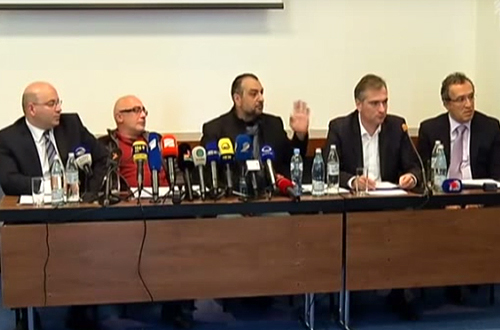
Screengrab from TV footage showing (from right to left) ex-owner of Rustavi 2 Kibar Khalvashi; his lawyer Paata Salia; ex-owner of Rustavi 2 and court-appointed temporary manager of the broadcaster Davit Dvali; ex-owner of Rustavi 2 Jarji Akimidze, and court-appointed temporary manager of the broadcaster Revaz Sakevarishvili at a news conference in Tbilisi on November 6, 2015.
Court-appointed temporary managers Revaz Sakevarishvili and Davit Dvali, as well as one of the former co-owners of Rustavi 2 TV Jarji Akimidze, made a joint appearance at a press conference along with Kibar Khalvashi and his lawyer Paata Salia. Court-appointed managers said “no one will be able to interfere” in Rustavi 2 TV’s editorial independence and “not a single” journalist will be sacked when they take over day-to-day operations of the channel. They, however, strongly ruled out possibility of calling police to enforce court’s decision amid Gvaramia’s refusal to leave the broadcaster’s premises and to hand over management to the court-appointed administration. At the same press conference Khalvashi announced about having a verbal agreement with Dvali and Akimidze according to which he would give halve of his shares of Rustavi 2 TV to the two men if he wins court case over broadcaster’s ownership dispute.
November 6, 2015
Court’s decision to replace management in Rustavi 2 triggered international reaction, which, among others, also included a joint statement of Tbilisi-based EU and U.S. diplomats saying that the November 5 court decision “raise serious questions about the independence of the judiciary and the actual degree of freedom of the media in Georgia.”
November 6, 2015
President Giorgi Margvelashvili said developments over Rustavi 2 TV “damage the country’s democratic image and international reputation”.
November 6, 2015
Court-appointed managers of Rustavi 2 TV offered late in the evening to the current owners of the broadcaster to name “any” person to whom interim managers would grant power of attorney with full authority to perform all the executive functions required for smooth day-to-day operation of the TV station. The proposal was made as Gvaramia was refusing to transfer management to the court-appointed administration. No operation, requiring authorization of top managers could be performed by the company as both Gvaramia and financial director Damenia were suspended and temporary managers, who replaced them, were not able to actually assume their duties – situation, which the both sides were saying was fraught with risk of having negative effect on company’s day-to-day operations.
November 7, 2015
Majority shareholders of Rustavi 2 rejected court-appointed managers’ proposal. Brothers Karamanishvili said in a written statement that they would not “legitimize political censors through cooperating with them.”
November 9, 2015
A group of civil society activists announced about launch of, what they called, round-the-clock vigil to defend Rustavi 2 from “any kind of attack and political or other type of influences.” The group was camped just outside the premises of broadcaster.
November 10, 2015
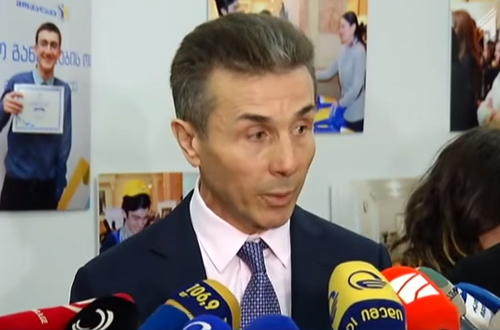
Ex-PM Bidzina Ivanishvili speaks with journalists in Tbilisi on November 10, 2015.
Ex-PM Bidzina Ivanishvili, who is accused by Rustavi 2 and many opposition parties of being behind what they call is an attempt to silence Rustavi 2, said that court’s decision to appoint temporary managers the broadcaster and the way it was taken, without an oral hearing, “is politically absolutely damaging” for the government. He said he also has “questions” over this decision of the judge.
November 11, 2015
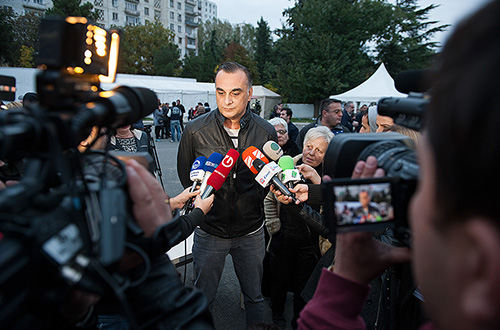
Deputy director of Rustavi 2 and anchor of the TV channel’s main news program, Zaal Udumashvili, speaks with journalists, October 22, 2015. Photo: Eana Korbezashvili/Civil.ge
Court-appointed managers unilaterally gave power of attorney to deputy director of Rustavi 2 and anchor of the TV station’s main news program, Zaal Udumashvili, to perform executive functions in the broadcaster. Court-appointed managers said they did so in an attempt to prevent problems in the company’s operations in the condition when suspended chief executive Gvaramia was refusing to transfer of management. But Udumashvili rejected to accept power of attorney from court-appointed managers.
November 12, 2015
Tbilisi City Court judge, Tamaz Urtmelidze, partly overturned his earlier ruling from a week ago and reinstated Rustavi 2 TV’s top management, including its director general Nika Gvaramia and financial director Kakha Damenia. Their executive powers were restored at least until appellate process into judge’s earlier decision on replacing the management was completed.
November 13, 2015
Constitutional Court ordered to suspend application of those clauses in the civil procedure code based on which judge ordered appointment of temporary managers in Rustavi 2 TV a week ago. This is Rustavi 2’s second constitutional complaint stemming from legal battle over broadcaster’s ownership dispute, unfolding in parallel in the common courts. Constitutional Court’s decision, which is an interim measure pending final verdict on Rustavi 2’s constitutional complaint, guarantees restoration of pre-November 5 status quo.
Now the focus is expected to be redirected back to the main trial involving ownership dispute case through which plaintiff Khalvashi wants to reclaim broadcaster’s shares, and which will continue in the Court of Appeals.
This post is also available in: ქართული Русский